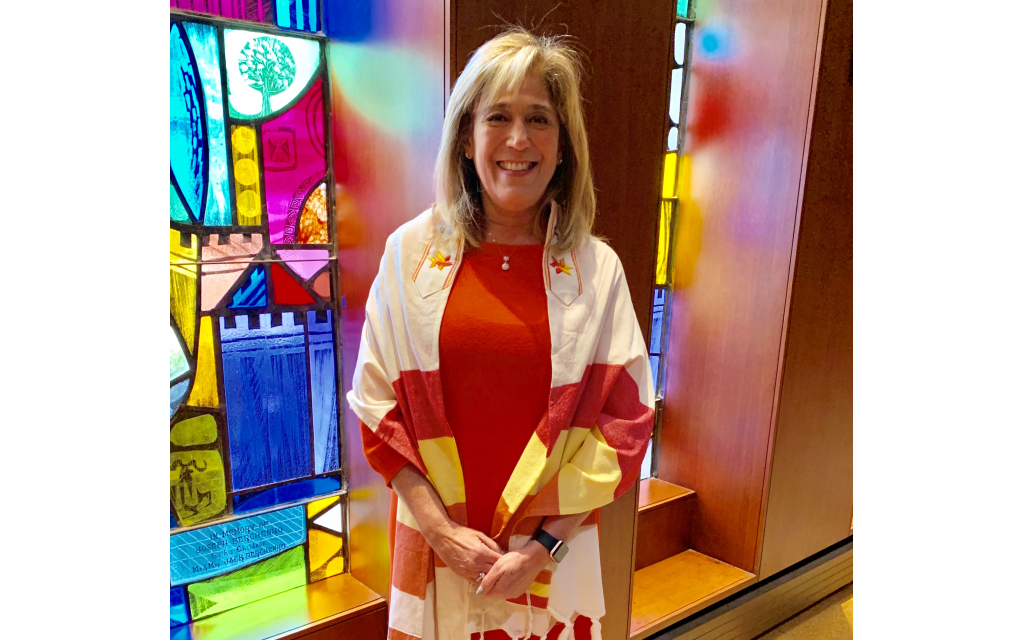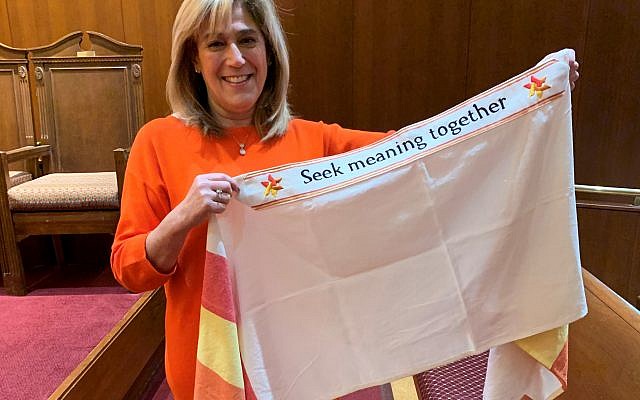Gold Exemplifies Leadership and Makes Atlanta Proud
Atlantan Margo Gold has given decades of service to the Jewish community and beyond.
After 37 years with the Atlanta Journal-Constitution and now with the AJT, , Jaffe’s focus is lifestyle, art, dining, fashion, and community events with emphasis on Jewish movers and shakers.
Whether leaders are born or evolve, Atlantan Margo Gold has given decades of service to the Jewish community and beyond. She recently retired after two, 2-year terms as international president of the United Synagogue of Conservative Judaism, saying, “This was pretty much a four-year full-time volunteer job!”
Leadership comes to those who are willing to work for it. Gold was president of both Ahavath Achim Synagogue and Congregation B’nai Torah, and has served in leadership roles for the Jewish Theological Seminary, Marcus Jewish Community Center, Jewish Federation of Greater Atlanta’s Community Relations Council, and the Jewish Council for Public Affairs, just to name a very few.
“Another organization for which I was proud to serve was Georgia Appleseed [Center] for Law & Justice, a public interest legal center serving the poor and marginalized. I’m also a World Pilgrim, a communal interfaith travel experience with Christians, Muslims and Jews.”
Gold is known as an effective leader because she is able to articulate ideas, motivate their implementation, extend credit to others and take keen interest in mentoring future leaders while dealing from compassion and hope. Learn about her impact and influence as she reminisces about her worldwide presidency.

Jaffe: What are some of the accomplishments of your tenure?
Gold: Our USCJ Community and Covenant Commission changed our membership guideline for congregational practice to balance the obligation of biblical covenant with communal inclusion.
Previously the guideline stipulated that only Jews could be members of Con-servative congregations; the new guideline states that each congregation can adopt their own guidelines for membership in their kehillah.
An example of past rigidity was omitting non-Jewish spouses from synagogue directories. We also rebranded USCJ, with an updated mission and value statement, brand and tagline that reflects vibrancy, energy and connection. Our new tagline ‘Seek meaning together’ encapsulates our vision and reflects connection at multiple levels. (This tagline is emblazoned on the tallit recently gifted to Gold.)
I’m also proud that, at a time of top professional leadership transition within USCJ and The Rabbinical Assembly, we pursued closer synergies between the two organizations and alignment around a vision toward support, sustainability and growth of the Conservative movement.
It was also particularly meaningful to me that we diversified the USCJ board, electing younger members (one-fifth of board is under 40) and more women.
Jaffe: What are the greatest challenges facing Conservative Judaism?
Gold: Conservative Judaism is often interchanged as a descriptor for USCJ or the Conservative movement. To me, Conservative Judaism evokes the religious values that are the heart of our beliefs and actions. ‘Conservative Judaism’ is hampered by an often misunderstood name. Conservative Judaism, itself, is an authentic and dynamic expression of Judaism that I believe deepens connec-tions and meaning personally, between people and with G-d. USCJ’s first value statement is “We thrive in the tension of old and new.”
Congregations are under stress due to declining affiliation numbers. For those inside and outside those congregations, opportunities for personal and spiritual connection are more important than ever.
Younger people don’t seek the same types of communal institutional attach-ments as previous generations. In a world of screens, keyboards and disconnection from face-to-face relationships, we need to stress the value of personal connections. ‘Seek meaning together’ conveys this imperative.
Jaffe: During your term, how was your time spent?
Gold: I often traveled to USCJ’s NYC central office and other centers of Conservative Judaism. I attended convenings of congregations, USY [United Synagogue Youth] and conventions of partner organizations. My personal favorite was rabbinic ordinations for both Jewish Theological Seminary and The Ziegler School. I went to Israel at least once a year, advocating at the PM’s office and the Knesset of behalf of religious pluralism, egalitarian rights at the Kotel, and the Masorti movement in Israel. I participated in the annual mission of the Conference of Presidents and served on its executive council.
I’m now one of those proficient in Zoom, Webex and Skype calls, getting to know folks ‘on screen from the shoulders up’!
Jaffe: The Conservative movement is more closely allying with the Reform movement?
Gold: Rabbi Wernick, as CEO of USCJ, and Rabbi Jacobs, CEO of URJ [Union of Reform Judaism], worked together on behalf of egalitarian access at the Kotel. The movements have supported one another in efforts around conversion, marriage and other religious matters in Israel. There’s support from a wide swath of organizations for our goals at the Kotel supporting religious pluralism and civility in Israel, including diaspora Orthodox partners.
Jaffe: What’s the Israeli piece of the puzzle?
Gold: The funds for Masorti and Reform institutions from the government are miniscule compared to Orthodox institutions. To help offset that, we seek participation in MERCAZ USA, our political wing. Delegates elected in North America can influence outcomes at the World Zionist Organization Congress in Israel in 2020. Influence there can translate to the ability to affect flow of funds to Masorti institutions. In a recent survey, almost 12 percent of the Israeli population identifies as Masorti. That percentage does not reflect affiliation rates, but it’s a promising start for Jewish identity among secular Israelis.
Jaffe: What’s next for you?
Gold: My husband Larry and I are co-chairing the JCPA 75th Anniversary Gala in D.C.
Something always finds me. I just spent four years as a full-time volunteer for an $18 million enterprise. For my next gig, I wouldn’t mind getting paid!
- Marcia Caller Jaffe
- Margo Gold
- Community
- United Synagogue of Conservative Judaism
- Ahavath Achim Synagogue
- Congregation B'nai Torah
- Jewish Theological Seminary
- Jewish Federation of Greater Atlanta’s Community Relations Council
- Jewish Council for Public Affairs
- Union of Reform Judaism
- Rabbi Steven Wernick
- Rabbi Rick Jacobs
- Feature
- News
- Marcus Jewish Community Center of Atlanta




comments